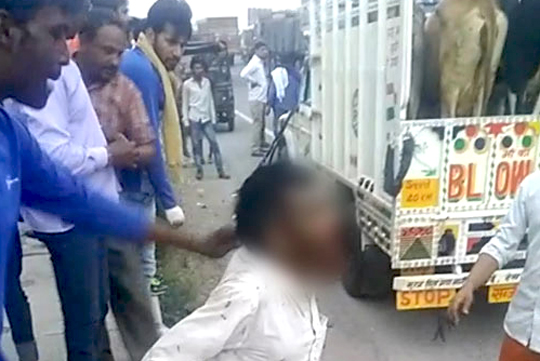The reprehensible acts by cow vigilantes seem to be going on unhindered. Some incidents have happened right in front of the police, who have turned a blind eye.

Despite the Centre issuing an advisory last year on the action to be taken by the state governments over such incidents, not much has changed on the ground. This has only emboldened self-styled cow protectors to have a free run.
A big concern is that most of the attacks have taken place in the BJP-ruled states, and as the saffron juggernaut rolls on election after election, the future could be unpredictable.
Uttar Pradesh
Noida, May 5, 2017
Two contact workers, assumed to be Muslims, thrashed for “cow smuggling”
Dadri, September 28, 2015 (The trigger)
* Mohd Akhlaq (52), son Danish dragged out of their house, beaten with bricks for storing and eating beef
* Akhlaq dies, Danish suffers severe injuries
* Chief Minister Yogi Adityanath bans cow slaughter after taking over in March
* Orders sealing of illegal slaughterhouses, triggering protests
Jammu & Kashmir
Udhampur, Oct 9, 2015
* Truck attacked with petrol bombs after rumours of it carrying dead cows
* Driver succumbs to injuries 10 days later
* Seven held for murder
Reasi, April 20, 2017
* Nomadic family with livestock intercepted
* Family, including nine-year-old girl, beaten with iron rods
* Four arrested and charged with attempt to murder
Cow slaughter or possession of its meat in J&K is criminal offence carrying jail term of not less than 10 years (now also in Gujarat)
Haryana
* Beef is banned, 10-year punishment for cow slaughter
* “Beef biryani policing” -- police squads check random eateries for selling beef
Faridabad, June 10, 2016
* Gau Rakshak Dal members stop beef transporters
* Force them to eat cow dung
Rajasthan
Alwar, April 1, 2017
* 50-year-old dairy farmer Pehlu Khan dies after vigilantes beat him up for transpoting cows; four others injured
* 7 arrested, but none who were named in FIR
* Vipin Yadav, an accused, was compared to Bhagat Singh by cow vigilante Sadhvi Kamal
Has a dedicated Cow Welfare Department, but 2,000 cows died in state-owned shelters due to negligence
Delhi
Kalkaji, April 22, 2017
* Three youths beaten up by around 25 men, said to be members of People for Animal, for transporting buffaloes
* Youth were en route to municipal slaughter house
* Cops arrested the youth first, attackers later
Kerala House, Oct 26, 2015
* Delhi Police raid Kerala House after complaints that beef was being served
* Hindu Sena claims it received a tip off
* The menu, it claims, has all items in English, except one which is in Malayalam
Gujarat
Una, July 11, 2016
* Four Dalit youths stripped, tied to an SUV and beaten up for skinning dead cow
* But CID report says cows were killed by lions
* Video of incident posted on social media with warning
Punjab
* Case filed on August 6, 2014, against Gau Raksha Dal after a video showing members brutally thrashing “cow smugglers”, went viral
*Dal chief Satish Kumar arrested from Vrindavan on Aug 22, 2016, after being booked on charges of sodomy, rioting and extortion
Telangana
* Struggle against Al kabir and Allanna mechanical slaughter houses of Medak district (earlier undivided AP) has been going on for long
* 'Gau Rakshaks' keep vigil on trucks that carry bovines and raid them
* Such raids result in communal tension, particularly during Bakrid
Andhra Pradesh
East Godavari, Aug 10, 2016
* Two Dalits who were skinning a dead cow were brutally beaten by locals
* Farmers who were searching for their missing cows mistook the duo as cow thieves, tied them to a tree and thrashed them
* 7 arrests were made in the case
Maharashtra
Senior BJP MLA Mangalprabhat Lodha seeks capital punishment for slaughtering cows and bulls
Jharkhand
Latehar, March 18, 2016
* Two Muslim men found hanging from a tree
* Mazlum Ansari (32) was a cattle trader; Imteyaz Khan (13) was the son of a cattle trader
Karnataka
Chikkamagalur, July 17, 2016
Seven Bajrang Dal members attack a Dalit family on suspicion of cattle theft and cow slaughter
Madhya Pradesh
Mandsaur, July 26, 2016
* Two Muslim women carrying buffalo meat slapped, kicked and abused by women members of Hindu Dal on suspicion that it was beef
* Police accused of making half-hearted attempts to intervene
Kerala
Surprisingly, for April 12 Malappuram Lok Sabha bypoll, BJP candidate N Sreeprakash promised “clean slaughterhouses for good beef”
Ernakulam, April 19, 2017
Eight RSS activists were arrested in connection with an attack on a house where a calf was slaughtered for Easter
Assam
Nangaon, May 1, 2017:
Two men lynched for “trying to steal cows” in a village, 130 km from Guwahati
Manipur
Imphal East, Nov 3, 2015
Headmaster of govt madrasa killed for “stealing cows” from his neighbouring village
What the Constitution says...
Article 48 (Directive Principles)
Organisation of agriculture and animal husbandry: The state shall endeavour to organise agriculture and animal husbandry on modern and scientific lines and shall, in particular, take steps for preserving and improving the breeds, and prohibiting the slaughter, of cows and calves and other milch and draught cattle.
Govt advisory of August 9, 2016
* States are enjoined upon and expected to ensure that any person who takes law into his/her own hands is dealt with promptly, and punished as per law
* There should be no tolerance at all for such persons and full majesty of law must come to bear on them, without exception





Comments
Add new comment